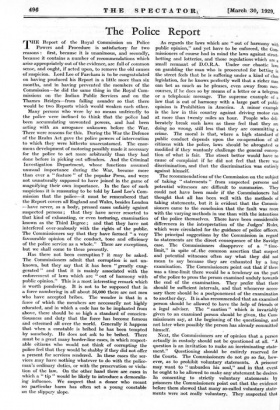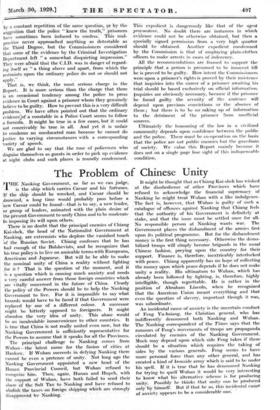The Police Report
THE Report of the Royal Commission on Police Powers and Procedure is satisfactory for two reasons : first, because it is unanimous, and secondly, because it contains a number of recommendations which arise appropriately out of the evidence, are full of common sense, and ought, if acted upon, to remove the old causes of suspicion. Lord Lee of Fareham is to be congratulated on having produced his Report in a little more than six months, and in having prevented the members of the Commission—he did the same thing in the Royal Com- missions on the Indian Public Services and on the Thames Bridges—from falling asunder so that there would be two Reports which would weaken each other.
Many persons who were by no means unfriendly to the police were inclined to think that the police had been accumulating unwonted powers, and had been acting with an arrogance unknown before the War. There were reasons for this. During the War the Defence of the Realm Act gave the police powers of intervention to which they were hitherto unaccustomed. The enor- mous development of motoring possibly made it necessary for the police to act more arbitrarily than they had done before in picking out offenders. And the Criminal Investigation Department, whose functions assumed unusual importance during the War, became more than ever a " feature " of the popular Press, and were not unnaturally supposed to have joined in the game of magnifying their own importance. In the face of such suspicions it is reassuring to be told by Lord Lee's Com- mission that the police—it must be remembered that the Report covers all England and Wales, besides London —have never, as a body, pressed cases unfairly against suspected persons ; that they have never resorted to that kind of exhausting, or even torturing, examination known as the Third Degree ; and that they have not interfered over-zealously with the rights of the public. The Commissioners say that they have formed " a very favourable opinion of the conduct, tone and efficiency of the police service as a whole." There are exceptions, but we shall come to these presently.
Has there not been corruption ? it may be asked. The Commissioners admit that corruption is not un- known, but they say that it has been " greatly exag- gerated " and that it is mainly associated with the enforcement of laws which are. " out of harmony with public opinion." This is a most interesting remark which is worth pondering. It is not to be supposed that in a force numbering in all about 56,000 there are not men who have accepted bribes. The wonder is that in a force of which the members are necessarily not highly educated, and in which a code has to be implanted from above, there should be so high a standard of conscien- tiousness and duty that the force has become famous and esteemed all over the world. Generally it happens that when a constable is bribed he has been tempted by somebody. He does not ask to be bribed. There must be a great many border-line cases, in which respect- able citizens who would not think of corrupting the police feel that they would be shabby if they did not offer a present for services rendered. In these cases the ser- vices may have nothing whatever to do with the police- man's ordinary duties, or with the preservation or viola- tion of the law. On the other hand there are cases in which a " tip " would be likely to introduce a demoraliz- ing influence. We suspect that a donor who meant no particular harm has often set a young constable on the slippery slope. As regards the laws which are " out of harmony with public opinion," and yet have to be enforced, the Com.
missioners of course had in mind the laws against street.
betting and lotteries, and those regulations which are a small remnant of D.O.R.A. Under our chaotic laws on gambling the man who is prosecuted for betting in the street feels that he is suffering under a kind of class legislation, for he knows perfectly well that a richer man can bet as much as he pleases, even away from race- courses, if he does so by means of a letter or a telegram or a telephonic message. The supreme example of a law that is out of harmony with a large part of" public opinion is Prohibition in America. A minor example is the law in this country against driving motor cars at more than twenty miles an hour. People who deli- berately break such laws as these feel that they are doing no wrong, still less that they are committing a crime. The moral is that, where a high standard of public conduct depends upon the co-operation of all citizens with the police, laws should be abrogated or modified if they wantonly challenge the general concep- tion of what is fair. The street bettor would have no cause of complaint if he did not feel that there was discrimination, and that the discrimination was entirely against himself.
The recommendations of the Commission on the subject of taking " statements " from suspected persons and potential witnesses are difficult to summarize. They could not have been made if the Commissioners had thought that all has been well with the methods of taking statements, but it is evident that the Commis- sioners came to the conclusion that the fault was more with the varying methods in use than with the intentions of the police themselves. There have been considerable differences in the interpretation of the Judges' Rules, which were circulated for the guidance of police officers. The principal suggestions by the Commission in regard to statements are the direct consequence of the Savidge case. The Commissioners disapprove of a " time- limit," in spite of . the common assertion that suspect and potential witnesses often say what they did not mean to say because they are exhausted by a long examination. The Commissioners point out that if there was a time-limit there would be a tendency on the part of the police to press the person examined unduly towards the end of the examination. They prefer that there should be sufficient intervals, and that whenever neces- sary there should be a postponement of the examination to another day. It is also recommended that an examined person should be allowed to have the help of friends or a legal adviser. The " caution " which is invariably given to an examined person should be given, the Com- missioners say, at the beginning of the questioning, and not later when possibly the person has already committed himself.
Next, the Commissioners are of opinion that a person actually in custody should not be questioned at all. "A question is an invitation to make an incriminating state- ment." Questioning should be entirely reserved for the Courts. The Commissioners do not go so far, how- ever, as to prohibit voluntary statements. A prisoner may want to " unburden his soul," and in that event he ought to be allowed to make any statement he desires. In consenting to strictly voluntary statements by prisoners the Commissioners point out that the evidence before them showed that many so-called voluntary state- ments were not really voluntary. They suspected that by, a constant repetition of the same question, or by the suggestion that the police " knew the truth," ;prisoners have sometimes been induced to confess: This mal- practice never approached anything so detestable as the Third Degree, but the Commissioners considered that some of the evidence by the Criminal Investigation Department left ." a somewhat disquieting impression." They were afraid that the C.I.D. was in danger of regard- ing itself as " a thing above and apart, from which the restraints upon the ordinary police do not or should not apply." - = - - -. _ That is, we think, the most serious charge in the Report. It is more serious than the charge that there is an occasional tendency among the police to press evidence in Court against a prisoner whom they genuinely believe to be guilty. How to prevent this is a very difficult problem.. We have often pointed out that the ordinary evidence:of a constable in a Police. Court seems to follow a formula. It might be true in a few cases, but it could not conceivably be true in all. And yet it is unfair to condemn an uneducated man because he cannot do justice to varying circumstances with a corresponding variety of speech.
, We are glad to say that the ruse of policemen who disguise themselves as guests in order to pick up evidence at night clubs and such places is roundly condemned. This expedient is dangerously like that of the agent provocateur. -No doubt there are instances in which evidence could not be otherwise obtained, but then a specially signed permission from a very high quarter should be obtained. Another expedient condemned by . the Commission is that of employing plain-clothes officers to make arrests in cases of indecency.
All the recommendations are framed to support the principle that a person is presumed to be innocent till he is proved to be guilty. How intent the Commissioners were upon a prisoner's rights is proved by their insistence that inquiries into the career of a prisoner awaiting his trial should be based exclusively on official information. Inquiries are obviously necessary, because if the prisoner be found guilty the severity of the sentence will depend upon previous convictions or the absence of them ; but there is to be no raking up of information to the detriment of the prisoner from unofficial sources. .
Ultimately Ahe honouring of the law in a civilized community depends upon confidence between the public and the police. There must be co-operation on the basis that the .police are not public enemies but the guardians of society. We value this Report mainly because it does not on a single page lose sight of this indispensable condition.



















































 Previous page
Previous page